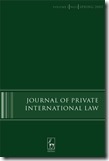Colloquium on the Choice of Courts Convention
The Hague Convention on Choice of Court Agreements is the result of negotiations that began at The Hague Conference on Private International Law in 1992, when the United States asked for the Conference to develop a convention on jurisdiction and judgments. A more comprehensive convention, which spanned the field of civil jurisdiction, was produced in draft form in 1999, and then revised in 2001. This draft convention proved unsatisfactory to a number of countries, including the United States, and so a less ambitious convention was attempted. The Choice of Courts Convention is the result.
The Choice of Courts Convention was concluded in mid-2005. Its fundamental aim is to improve the international enforcement of judgments made by courts that have been chosen by parties to commercial transactions. As a result, the Choice of Courts Convention is a ‘double convention’ that gives common rules of jurisdiction and common rules for the enforcement of judgments between Convention countries. The rules of jurisdiction themselves aim to improve the effectiveness of forum selection agreements, and therefore to give greater certainty and predictability to international commercial transactions and international trade.
The Colloquium
The Choice of Courts Convention has been presented as either an important step towards securing the harmonisation of rules of jurisdiction for international commercial and trading relationships or – compared with the draft convention of 1999 – a consolation prize of limited scope and use. This Colloquium will explore the significance of the Choice of Courts Convention, examine its implications for other areas of transnational law, and investigate legal questions that it raises – in general and specifically for Australia.
The Colloquium is being held at the Law School, University of Southern Queensland, Toowoomba, Australia, on Friday 3 October 2008. Nine scholars of private international law and transnational law will be giving papers (see the Colloquium Program below). Anyone interested in attending should contact Ms Mary Ann Armstrong: armstrog@usq.edu.au
Colloquium Program
- The Choice of Courts Convention: Background and Negotiations – Professor Paul Beaumont, School of Law, University of Aberdeen
- The Choice of Courts Convention: Is it Worth Implementing? – Professor Richard Garnett, The Melbourne Law School, University of Melbourne
- Exceptions under the Choice of Courts Convention – Associate Professor Mary Keyes, Law School, Griffith University
- The Choice of Courts Convention and the Exclusion of Maritime Claims – Dr Craig Forrest, TC Beirne School of Law, University of Queensland
- The Choice of Courts Convention and the Vienna Convention on the International Sale of Goods (CISG) – Dr Des Taylor, School of Law, University of Southern Queensland
- The Choice of Courts Convention – How will it work in relation to the Internet and e-commerce? – Associate Professor Dan Svantesson, Faculty of Law, Bond University
- The Hague and The Ditch: The Choice of Courts Convention and the Australia-New Zealand Treaty on Jurisdiction and Judgments – Professor Reid Mortensen, Law School, University of Southern Queensland.
- Enforcement of Judgments under the Choice of Courts Convention – Dr Anthony Gray, School of Law, University of Southern Queensland, Springfield
- Res Judicata and Forum Shopping under the Choice of Courts Convention – Mr Justin Hogan-Doran, Wentworth Cambers, Sydney
 The Journal of Private International Law will hold its third major conference at New York University on April 17-18, 2009. As was the practice at the prior conferences at the University of Aberdeen in 2005 and at the University of Birmingham
The Journal of Private International Law will hold its third major conference at New York University on April 17-18, 2009. As was the practice at the prior conferences at the University of Aberdeen in 2005 and at the University of Birmingham 